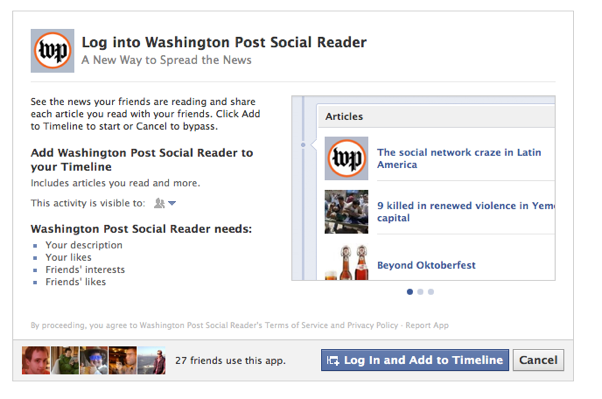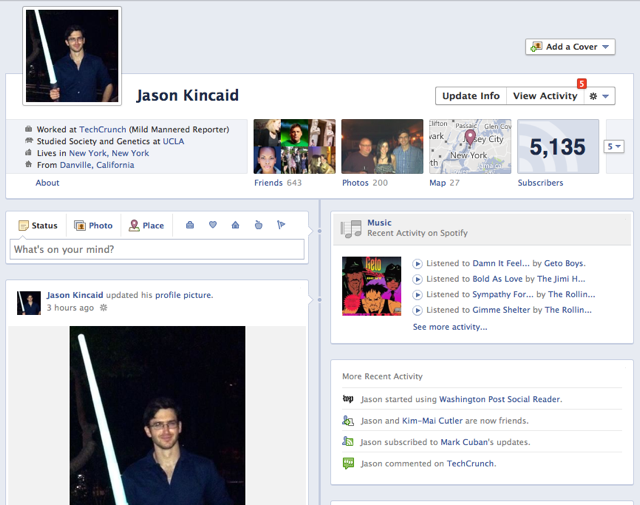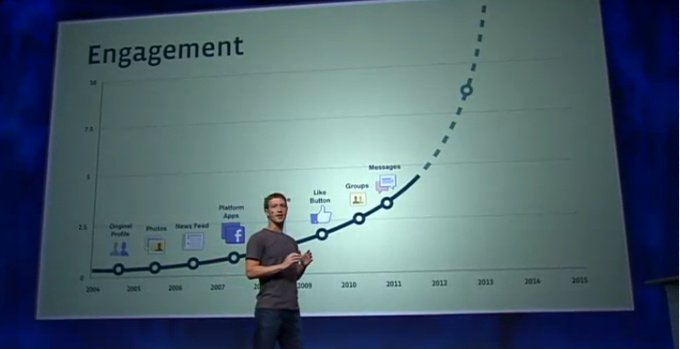It’s been over 72 hours since Facebook first debuted a series of groundbreaking new features at f8, which is all the time I need to predict the company’s long-term outlook, the way it will reinvent the web, and the pricing of its inevitable IPO.
Okay, maybe not. But it’s given me some time to try the features out, as opposed to basing my impressions off of Facebook’s well-crafted keynote presentations. And while many of these obviously have a lot of potential, in practice I’m finding them to be a mixed (or, in some cases, a downright irritating) bag.
Social Overlubrication
One of the big announcements at f8 was something called frictionless sharing. Here’s the gist: Facebook will let third-party sites and apps integrate what’s effectively a sharing firehose. Turn it on, and everything you do in the app gets shared with your Facebook friends.
As Facebook CEO Mark Zuckerberg explained during his keynote, the idea is that a lot of people aren’t sharing as often as they could be, because there’s friction involved with clicking all those ‘Share’ dialogs. Hence the term frictionless sharing: you visit a site or app, activate sharing once, and you’re done. Everything you do from that app gets automatically shared, and you can always turn it off if you decide you want to keep your activity private. Pretty nifty, right?
My concern with this new, frictionless sharing, is that it doesn’t actually get rid of the friction at all — it just moves it. Where before I’d have to exert some effort (albeit a minimal amount) to explicitly share a piece of content, with this new effortless sharing I’m going to deal with a nagging feeling in the back of my head wondering if I really want the article I just clicked on to be shared with friends. I think the word for that is stress, or maybe anxiety. Which qualify as forms of friction in my book.
Put another way, with old-school sharing, the only real potential downside is that I’ll forget to share something that my friends might find interesting. Big whoop. With this new, lubricated sharing, a mental lapse could wind up with my sharing something uncouth with my friends. Which, depending on who your Facebook ‘friends’ are and your profession, could actually matter.
Granted, there are going to be applications and sites that people are willing to freely share from without any hesitation — you’d be hard-pressed to find many stories over at The Economist that you’d be embarrassed about sharing (why yes, I did spend the afternoon reading about Argentinian trade restrictions). But there are plenty of mainstream sites that run news on topics that you might not want syndicated to your boss or family members. Things like drug legalization. Or sex (ack!). Or Jersey Shore. Which means another privacy backlash might be around the corner.
I know, I know — the press (including me) has cried foul over Facebook’s privacy-stripping features many times before, and the vast majority of its users have shown time and time again that they just don’t care. But I attribute that more to them being ambivalent than I do to Facebook knowing what its users find socially acceptable. Maybe this is the time they’ve crossed the line, maybe it isn’t — either way, we’re going to see a lot of news articles about frictionless sharing and probably some letters from Congress.
If nothing else, I bet the warning signs on the ‘Accept’ dialog for this feature get a lot more prominent in the next few months. Check out the box below — they’re not exactly going out of their way to point out that this is sharing every article you read through the app, are they?

And, privacy and friction aside, there’s another big question: does anyone even want to see these auto-shared items in the first place?
The Ticker
 One of the big features launched by Facebook this month, and the one that facilities this frictionless sharing, is the Ticker. It’s that real-time stream on the homepage’s right sidebar, and it’ll follow you throughout the site if you open your browser on a wide enough screen.
One of the big features launched by Facebook this month, and the one that facilities this frictionless sharing, is the Ticker. It’s that real-time stream on the homepage’s right sidebar, and it’ll follow you throughout the site if you open your browser on a wide enough screen.
Unlike the News Feed, which uses a bunch of algorithms to try to surface interesting content, the Ticker is supposed to be a real-time stream of everything all of your friends do (or at least, it uses far less selective algorithms). And because all of this content is constantly flowing past, you don’t have to feel bad for filling it with these auto-shared posts, since your friends will only see them for a few seconds. That’s the idea, anyway.
The first day the Ticker showed up for me, I thought it was nifty. Finally, Facebook was giving me a constantly-updated stream of content to scan, in much the same way Twitter does. I like to waste time as much as anyone, so this was a welcome addition.
But I’m increasingly coming to believe that Ticker, at least in its current form, falls short.
For the last few years I’ve played a little game with myself as I scan through my various social feeds. It’s called “Don’t Give a Shit”. Every time I read a post on Twitter and the voice in the back of my head says the aforementioned phrase, I add a number to my mental tally. If that number reaches a certain threshold, I cuss a few times and swear off Twitter for the rest of the day. I’d like to think it’s cathartic.
I should note that only a minority of the posts I’m disinterested in warrants such a visceral reaction — I really don’t mind, say, a link my friend genuinely thought was neat but didn’t resonate with me. Rather, it’s the updates that I wish were never shared in the first place. Syndicated Foursquare check-ins often fall under this category, as do multi-tweet rants and ‘live tweeting’ of panels that are being both live streamed and live blogged (and aren’t particularly interesting to begin with).
Facebook’s News Feed has generally fared well in this game. Sure, it has plenty of misses, but it’s rare for me to see a piece of content in my Feed that evokes real annoyance — which is why I’ve been reading my News Feed every day for, what, five years now.
Which brings me back to Facebook’s Ticker. It is losing at my game, and badly.
I do not care that a ‘friend’ I haven’t talked to since high school comments on the status of a person I don’t know. I don’t care if one of my coworkers is listening to a Lady Gaga song that came out two years ago. And when one of my Facebook friends goes on a ‘Liking’ marathon as they browse through their friends’ wall posts, I don’t need to see four separate updates telling me about each one.
These irrelevant updates wouldn’t bother me if they were the exception to the rule — but they make up the majority of the updates showing up in my Ticker feed. And the Ticker updates in near real-time, so it keeps moving and drawing my eyes toward it. What’s worse, even the Ticker updates from my real friends are rarely very compelling. The minutiae of my friends’ online habits just don’t interest me very much.
Take Facebook’s recently-launched music integration, for example. Right now as I stare at my Ticker, I’m seeing a stream of songs that my friends are listening to. Sometimes I’ve never heard of the song. Sometimes I have. Sometimes I really like the song. And, almost always, my immediate impulse is neither to ‘Like’ their update nor to start listening to that song myself. I usually just shrug my shoulders.
The fundamental issue is that there’s no context or emphasis around any of these posts. I see song after song scroll by, and I don’t know which ones are actually important to my friends. I don’t know which are the tracks they love — and which are the tracks they left playing as they stepped away to grab lunch. And, as more applications and sites begin syndicating into the Ticker, I’m going to run into the same problem. I won’t know which news articles my friends have endorsed, and which ones they just happened to click on because they saw a link in Twitter. And there’s just so much stuff.
Of course, you can still explicitly share the content you really enjoy (the Like and Share buttons make that easy). But these posts will be shared in News Feed, as before, and if they’re appearing in Ticker they’re going to be competing with a lot of noise.
All of that said, the feature is hardly doomed. Right now, Facebook employees are poring over all of the initial data from the existing frictionless apps, and they’ll doubtless be making plenty of tweaks to ensure that you’re seeing a lot of content that you’re at least somewhat interested in. But at this point, my eyes are already becoming numb to the Ticker.
The Good Stuff
Facebook launched other major features at f8. And, despite my gripes above, I really like some of them.
First up we have Facebook Timeline, which is an overhauled profile that gives a visual recap of your history on the site (and, if you take the time to add additional content from your pre-Facebook days, your entire life).
I think it’s nifty. Yes, the first time you scroll though it can be jarring — and, depending on the life hurdles you’ve faced over the years, can be quite sad. But the same could be said of a dusty shoebox full of photos or love letters, and it doesn’t take a whole lot of work to remove the things you don’t want to see from your Timeline (my fix for people who don’t want to revisit their past at all: Facebook could offer an option to simply begin the timeline at a more recent date).

Some people have written that Timeline is creepy, because it lets people get such a comprehensive snapshot of your past so quickly. I understand that sentiment, but I don’t think it’s as creepy as, say, the automatic sharing discussed earlier. For one, I suspect that many people habitually look through friends’ photos anyway (even going years back), and if someone really wants to look into your past, clicking the ‘More’ button on your Wall a bunch of times never posed much of a barrier.
Another way of looking at it: just because you rarely venture back through your Facebook history doesn’t mean your potential employers, significant others, or bored friends won’t. So maybe you should clean things up anyway.
The Timeline is also where some of the more compelling parts of the new Open Graph API come into play. Developers will now be able to craft widgets that appear in users’ Timelines, and they can update these widgets depending on what users do in their apps. So, for example, if you had a recipe app on your iPad with Facebook integration, you could have a section in your Timeline featuring the recent recipes you’d made (and maybe even photos of each). Facebook offered similar third-party widgets years ago, but removed them because of clutter. The Timeline fixes this by presenting everything in a sort of sleek chaos that’s flexible without being overly messy, and there’s a lot of potential here for users and developers alike.
And, despite my gripes about music sharing earlier, I’m actually really liking the Music Dashboard, which presents the trends Facebook has garnered from your friends’ listening habits — things like top albums and artists. This dashboard, and the structured News Feed stories that show similar trends, seem like the right way to surface this auto-shared data. I might not care about the song my friend is listening to right now, but if two of my friends listened to the same album today, then hey, maybe I’ll check it out.

Is Sharing Still Caring?
To close, I want to take a step back and look at Zuckerberg’s Law, which was referenced during the f8 keynotes. The law goes something like, “the amount of information you share online doubles every year”. And, given the features Facebook just launched, this seems like it will certainly be the case (or perhaps even an understatement).
Thing is, I’m not sure Facebook or its users are ready for that surge in sharing. Between Twitter and Facebook, I think I’m approaching my limit for how much shared content I can consume on a daily basis. Hell, sometimes I find myself getting annoyed at certain friends for sharing too much. Which means Facebook needs to get much better at identifying the content that I’ll find interesting.
The site’s increased emphasis on friend lists will help with that, because it’s easy to hone in on the content that’s been shared by your closest friends. But even then, do you really care about your good friends so much that you want to read about each song they listened to, or article they read, or game they played? At some point, you’re going to get sick of them.
All of that said, this is hardly a new revelation for Facebook. They’ve been trying to surface interesting content since the origins of News Feed, and their most recently recommendation-related feature, Smart Lists, are actually scary smart sometimes. Let’s just hope that those algorithms can keep pace with the wave of content that f8 is about to unleash.






























Comment